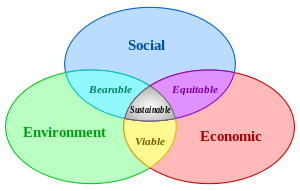Environmental organization

An environmental organization is an organization coming out of the conservation or environmental movements that seeks to protect, analyse or monitor the environment against misuse or degradation from human forces.
In this sense the environment may refer to the biophysical environment, the natural environment or the built environment. The organization may be a charity, a trust, a non-governmental organization or a government organization. Environmental organizations can be global, national, regional or local.
History
Founded on 28 May 1892 in San Francisco, California, Sierra Club was one of the first large-scale environmental preservation organizations in the world.[1]
Politics
Most organizations exert more influence through their involvement in policy making. Green politics is a political ideology which emphasizes the importance of achieving environmental goals. The Green parties have formed to implement environmental policies at a government level.
Issues in focus
Some environmental issues that environmental organizations focus on include pollution, waste, resource depletion, human overpopulation and climate change.
List of environmental organizations
Notable global environmental organizations are the United Nations Environment Programme (UNEP), World Wide Fund for Nature,[2] the Intergovernmental Panel on Climate Change (IPCC), Greenpeace and Friends of the Earth.
Counter-movements
Many interest groups and associations have been formed, often industry supported, to counter the progressive - capitalism- and economy-skeptic attitude and influence of environmental organizations. However, these interest groups are rarely pure in ideological nature.
See also
References
Further reading
- Johnson, Erik W.; Scott Frickel (2011). "Ecological Threat and the Founding of U.S. National Environmental Movement Organizations, 1962–1998". Social Problems. 58 (Aug. 2011) (3): 305–29. doi:10.1525/sp.2011.58.3.305.
This study examines the role of "ecological threat" in shaping the U.S. environmental movement. … Declines in wildlife populations are associated with the foundings of wildlife and wilderness protection organizations while increases in air pollution are associated with the foundings of organizations focused on ecosystem well-being and public health.

